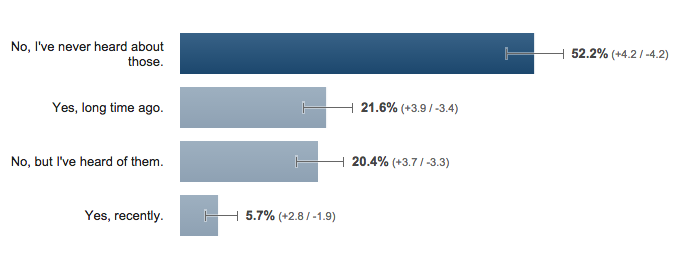I recently ran a miniature survey to gauge interest in egamebook and to find out more about the kind of people who might be interested in it. I thought I’d share what I learned because much of it could be interesting to others.

The survey ran in Google Consumer Surveys, which is a tool that lets people do market research. These surveys then run on the web as an alternative to internet pay walls for websites that publish content. The surveys are pretty accurate, at least if you trust Nate Silver, who says that “the Google consumer surveys’ election polls were ranked second in terms of reliability and lack of bias in predicting election results.”1 The software does the statistical magic to convert from numbers about recipients (sample) to numbers about the society (population) for you. The surveys are paid — one answer ranges from $0.10 to about $2.00.
Disclaimer: I am a Google employee. But I did pay full price for the survey, and I had no internal help setting it up nor running it.

There were only two questions:
- Have you ever read a Choose-Your-Own-Adventure book or a gamebook?
- How does this prototype of a mobile e-gamebook look to you?
With Consumer Surveys, you get demographic data ‘for free’ — you don’t need to ask how old people are, what their income is, and so on. These pieces of information are inferred and approximated. So we have some data on who the people that play(ed) gamebooks are.
The survey ran in the US and so the numbers below apply to the US population.
Are you ready for the results?
I originally wanted to write an analysis for the data, but I think it’s better to just give you the link to the survey results (which I just made public) and a couple of highlights. I’ll ignore the second question here as it is specific to egamebook. Let’s focus on the data on gamebooks in general.2
- About 48% Americans have at least heard about gamebooks or Choose-Your-Own-Adventure games.
- Generally speaking, the younger you are, the more likely you are to know about gamebooks.
- People who are 25-34 years old know them the most (only 37% have never heard the term).
- When it comes to actually playing them, recently, the youngest cohort (18-24) wins (11%) followed by 25-34 (8%).
- Men are only slightly more likely to know about gamebooks and play them than women.
- Gamebook seem to be (have been) most popular on the West coast and in the Norteast of US.
- Gamebooks are best known to the rich ($100K+ income). People with median income know the least about them.
- It looks like parents are more likely to have played a gamebook recently than non-parents.
None of those are too surprising, but it’s good to have a bit of hard data.
-
I’ll be a horrible person and report differences even when error bars overlap. Scientifically, it’s wrong to say there’s a difference. But I feel like in some cases, the error bars overlap so slightly it may not be scientifically correct but it’s still worth reporting. You can see the data anyways, so make your own mind. ↩